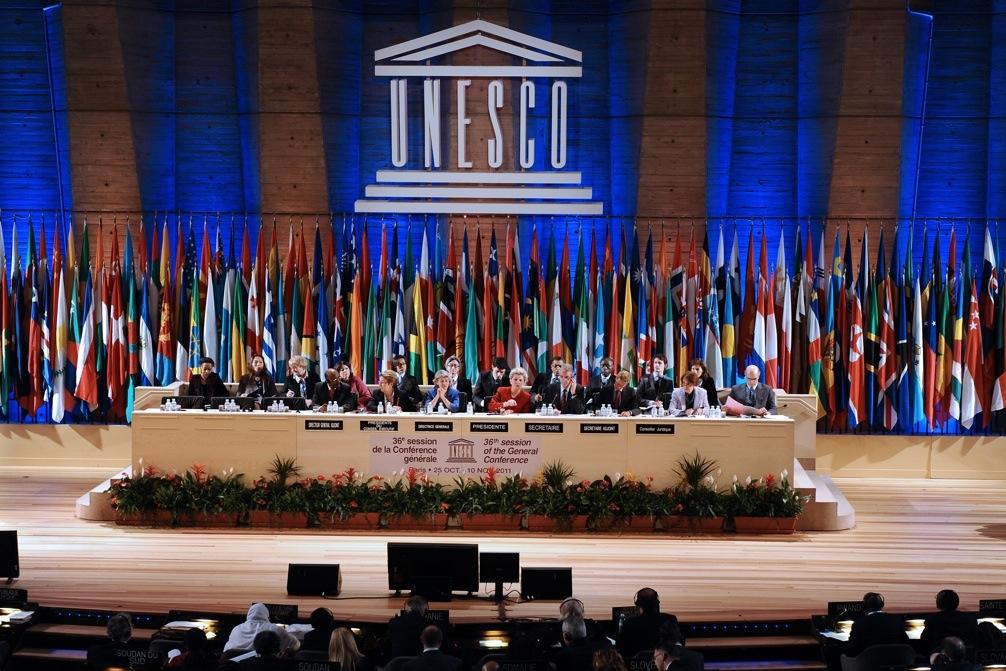A UN agency has voted for Palestinian statehood. So what?
UNESCO members vote for Palestinians to enter as a full member on Oct. 31, 2011 at the headquarters of the organization in Paris.
JERUSALEM — The acceptance by the UN Educational, Scientific and Cultural Organization of the Palestinian bid for state recognition last week has left almost all involved parties in a quandary: how to transform this unusual, confusing vote into a positive public relations outcome.
The UNESCO gambit was spearheaded by Palestinian chief negotiator Sa’eb Erekat, a veteran of the international political scene, who hoped to regain traction and public recognition after a dispiriting month and a half in which the Palestinian Authority’s claim to be recognized by the UN itself lost some oomph.
Related: Israel and Palestine are giving up on America
The UN Security Council, the body charged with determining which applications are accepted for full UN membership, changed configuration in the past few weeks, and new members Pakistan, Morocco, Togo and Guatemala are viewed as less friendly to the Palestinian request than Lebanon, Nigeria, Gabon, Bosnia and Brazil were before rotating out.
It is unclear what the chances are for recognition of the as yet undefined and borderless state of Palestine. But the United States, a permanent member of the Security Council, is bound by domestic law to cut its funding to any organization that independently recognizes, in the absence of a peace agreement with Israel, a Palestinian state.
The release last month of 1,027 Palestinian prisoners in exchange for Israeli soldier Gilad Shalit provided Hamas, the rival faction within the Palestinian Authority, which held the soldier for five years, and Egypt, that shepherded the final deal, a burst of publicity that the Palestinian Authority wishes to replicate for itself.
UNESCO is known principally for anointing “World Heritage Sites.” It is not a body certified to proclaim new states, and even within the context of the UN and its multiple dependent agencies, it remains unclear what the meaning of UNESCO’s acceptance of Palestine will be.
UN Secretary General Ban Ki-Moon expressed a widely-felt weariness with the situation when he said, in an interview with the Associated Press, that the new Palestinian tactic of seeking recognition from UN agencies is “not beneficial for Palestine and not beneficial for anybody.”
The Palestinian Authority has said it plans to apply for membership in 16 other UN agencies in open defiance of Ban’s appeal that it waits for a Security Council decision.
"This will have implications for all the agencies of the United Nations," Ban said. ‘When an organization is not properly functioning because of a lack of resources, you have to think about the millions and millions of people who are being impacted and affected.”
The United States, Israel and Canada cancelled their annual subsidies to UNESCO immediately following the vote.
Erekat responded with some ire to Ban’s suggestions, pressing the UN chief to lobby the US Congress rather than expect a change of strategy from the Palestinians.
Related: Why the French differ with Obama over Palestine
“I think it would be easier for Mr. Ban Ki-Moon to ask the Congress to change their laws," Erekat said. "I don't think Palestine's admittance to any of these agencies will bring harm."
Meanwhile, the push, which was loudly condemned in Israel, provided Israeli Prime Minister Benjamin Netanyahu’s government with the necessary footing to shore up its right-wing flank: UNESCO’s vote was greeted in Israel by the immediate announcement of new permits to build 2,000 housing units in contested areas of East Jerusalem and the West Bank.
The Palestinian Authority has demanded a complete freeze on settlement growth as a condition for the resumption of peace negotiations with Israel, and Xavier Abu Eid, a spokesman for Erekat, said the Israeli decision would “destroy the peace process.”
Israel insists on renewal of talks without preconditions.
The housing units in question, in fact, change little on the ground as they are all included within areas already populated and which are likely to remain within Israeli borders in any peace agreement. Still, the move provided grist for the political mill, with a spokesman for Israel’s foreign ministry saying that the “unilateral Palestinian maneuver further removes the possibility for a peace agreement and places unnecessary burdens on the route to renewing negotiations.”
Both the Palestinian and the Israeli decisions set back recent American efforts to restart peace talks between the two sides, who continue to play a poker game in which all parties have a poor hand, and the winnings are measured in newspaper columns.
Related: US cuts funding after Palestine vote
Every day, reporters and producers at The World are hard at work bringing you human-centered news from across the globe. But we can’t do it without you. We need your support to ensure we can continue this work for another year.
Make a gift today, and you’ll help us unlock a matching gift of $67,000!
